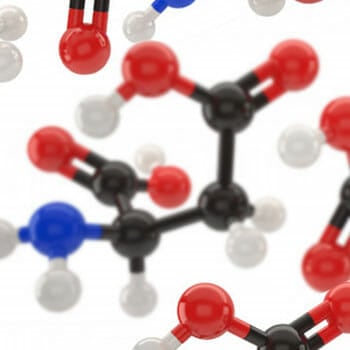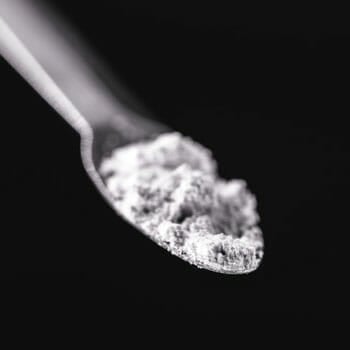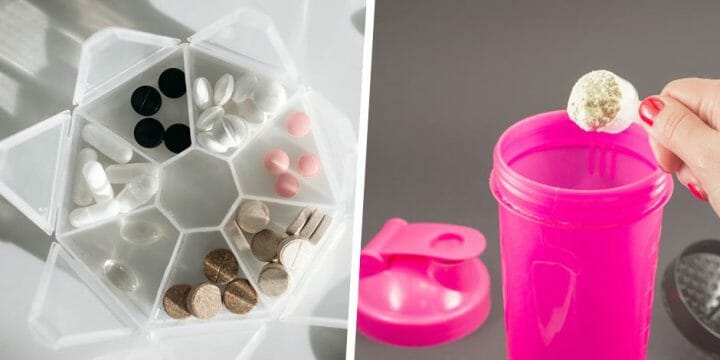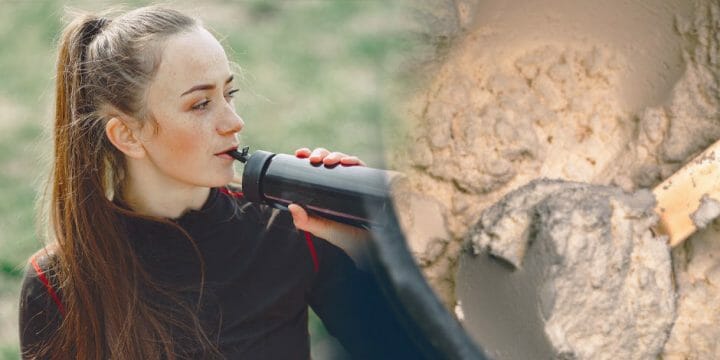Creatine monohydrate is the widely used form of creatine. It is known to power muscles enough energy for high-intensity exercise.
However, a newer form called creatine nitrate claims to offer something creatine monohydrate does not have.
I dived into reliable articles and experts to gather information about what creatine nitrate is, its difference from creatine monohydrate, and its uses and benefits, and more.
So let’s get right into it.
Quick Summary
- Creatine nitrate is a supplement that combines the benefits of creatine with dietary nitrates, aiming to enhance athletic performance and muscle mass.
- This supplement is highly soluble in water, which may lead to better absorption and the possibility of taking a lower dose compared to other forms of creatine.
- In a 28-day study by the National Institute of Health, athletes supplementing with creatine nitrate experienced a significant increase in lean mass, indicating its potential for muscle building.
- Personally, I find that creatine nitrate seems to offer a noticeable improvement in workout endurance and recovery, making it a valuable addition to my fitness regimen.
What is Creatine Nitrate And How it Works?
Creatine nitrate is a new form of creatine made from putting together the benefits of creatine plus dietary nitrates. Let us break that up a bit.
Creatine

Creatine naturally occurs in our body and is made from amino acids. It helps muscles during high-intensity exercise.
When the supply of energy, in the form of ATP or adenosine triphosphate for these explosive movements, runs out, creatine converts to a chemical to create more ATP giving the muscle more power to work.
Our muscles store 95% of creatine while our brain, liver, and kidney have the other 5%.
We can get creatine from high-protein foods such as red meat and fish; however, supplementing with creatine provides a higher dose for our muscles.
Nitrates

Nitrates are substances made from nitrogen and oxygen molecules found in our bodies and some vegetables such as broccoli, cauliflower, collard greens, and root vegetables.
Nitrates can convert to nitric oxide, which is a significant substance for maintaining overall health.
Nitric oxide helps widen the blood vessels, improve nutrient flow, and lower blood pressure. It also helps more oxygenated blood to reach your heart to keep it healthy.
In short, a good supply of nitric oxide lowers the risk of illnesses such as heart diseases and diabetes.
Creatine and Nitrate Combined

Creatine plus dietary nitrate supplementation claims to have promising results.
Since nitrates in the form of nitric oxide give you a good supply of oxygenated blood, nitrate supplementation is found to decrease the amount of oxygen you use in exercise while still maintaining the lifting volume.
It improves your energy efficiency, helping you perform heavy resistance training for a longer period.
Creatine Nitrate vs Creatine Monohydrate

Creatine monohydrate and creatine nitrate are the two most popular forms of creatine in the market.
Here is some information to decide which is better to use between the two.
Creatine Nitrate
- New formulation
- Has higher water solubility — easily dissolves in water
- Found to improve endurance performance
- Reduces loss of oxygen in exercise
Creatine Monohydrate
- Is a widely used creatine supplement
- Is the well-researched form of creatine
- Increases muscle mass and strength
- Regenerates supply of energy faster
- Number of researches claim as the best form of creatine

Creatine nitrate provides a small pump because of the addition of the nitrates, but the difference is minimal. Creatine monohydrate remains tough to beat because of its proven effectiveness.
“Certainly the nitrate component may enhance exercise performance, but the data, compared to monohydrate, is limited.”
– Jose Antonio, CEO, & Co-founder of International Society of Sports Nutrition
Another thing is that both forms of creatine have the same role to play in bodybuilding; although creatine nitrate has higher water solubility, research shows that our bodies can efficiently absorb creatine monohydrate, too.
Creatine monohydrate is also the widely used and well-researched creatine supplement.
Similar Post: Creapure vs Creatine Monohydrate
2 Main Uses

Here are some of the uses of the supplement.
1. Athletic Performance
From my own experience, supplementing with creatine nitrate has noticeably boosted my sprinting endurance and jump height. It feels like I'm able to push through the final laps and jumps with more vigor, which I attribute to the explosive energy boost that creatine nitrate provides.
Because nitrate helps decrease the loss of oxygen in the body, it also improves an athlete's energy efficiency.
2. Muscle Mass and Strength
In the month I incorporated creatine nitrate into my regimen, I saw a tangible increase in muscle bulk, without any uptick in body fat. The strength gains were also undeniable, allowing me to up my weights significantly during sessions.
In a 28-day study by the National Institute of Health, of athletes taking the supplement, the analysis showed a significant increase in their lean mass [1].
Stronger muscles help you do more sprints, bench press, and other quick and explosive strength training. It also lowers the risk of injury and keeps your body weight healthy.
4 Major Benefits of Creatine Nitrate

Creatine nitrate is said to offer other results not found in creatine monohydrate. Here are some of them.
1. High Solubility
Creatine nitrate’s high solubility allows our bodies to absorb it better. It also means you can take a high concentration of creatine at a lower dose. So instead of the recommended 5 grams of creatine per day, it is advised to take half of its dose when using creatine nitrate.
2. Improves Oxygen Flow
Nitrates converting into nitric oxide significantly improves the overall health of an individual. It has a lot to do with its ability to widen the vessels allowing nutrients and oxygen to flow efficiently in our bodies. It results in a lower risk of diseases and health disorders.
3. Boosts Endurance
If you want to perform heavy exercises for an extended period and therefore grow bigger and stronger muscles, creatine nitrate supplements may do the job. Creatine can supply your muscle fibers with energy to perform high-intensity workouts at maximum.
4. Fights Fatigue
Like other creatine supplementation, creatine nitrate is known to help fight off fatigue.
My weightlifting sessions used to leave me completely drained. But after starting on creatine nitrate, I've noticed a significant reduction in fatigue.
A study from the shows that creatine supplements help reduce fatigue among athletes who took the cycling test during the high heat [2].
Dosage and Side Effects

Dose
A 1-3 gram dose of creatine nitrate is generally safe for healthy people.
A National Institute of Health (NIH) study found no bad effects with 1-2 gram daily doses over 28 days [3], suggesting it's a safe creatine monohydrate alternative.
The International Society of Sports Nutrition (JISSN) agrees on its safety.
A 3-gram daily dose in a study showed similar results to creatine monohydrate, without safety issues. But one should keep in mind that creatine monohydrate has the most science-back research compared to other forms.
Side Effects
Creatine is one of the safest supplements for athletes and bodybuilders. It's best for high-intensity training, less so for low-intensity workouts.
While some worry about kidney or liver issues, there's no solid research backing these claims. No known drug interactions, either.
Some people report mild side effects like dizziness, heart irregularities, shortness of breath, nervousness, and blurry vision. If you're sensitive to these or taking other supplements, best to consult your doctor first.
Synergistic Effects with Other Supplements
Mixing creatine nitrate with beta-alanine, caffeine, and AAKG has seriously upped my game, especially in high-energy workouts like interval training.
Here's the lowdown:
- Creatine nitrate: Quick energy boost for short, intense bursts.
- Beta-alanine: Ups carnosine in muscles, fighting acid build-up and delaying tiredness.
- Caffeine: Sharpens focus and ups energy.
- AAKG: Boosts nitric oxide, improving blood flow.
This powerhouse combo does wonders: creatine nitrate for energy, beta-alanine to keep going, caffeine for sharpness, and AAKG for better nutrient flow. It's a winning formula for enduring tough workouts like weightlifting, sprinting, or high-intensity intervals.
Related Posts:
FAQs
Does Creatine Nitrate Cause Weight Gain?
Creatine supplementation may cause weight gain because it increases the amount of lean tissue; however, it does not cause body fat buildup.
What Does Creatine Nitrate Do to Your Body?
There are several benefits of taking creatine nitrate supplements, such as boosting your muscle strength, increasing muscle mass, and enhancing exercise endurance. In addition, it is known to improve the overall exercise performance of athletes and bodybuilders.
Not only does it help with your bodybuilding goals, but it also has physiological benefits such as avoiding risks of heart disease and diabetes.
Are There Issues With Creatine Nitrate?
When healthy individuals take a dose of creatine nitrate at 2-3 grams daily, it is generally proven safe. However, there are reported adverse effects of creatine nitrate, such as dizziness and headache.
What Is the Difference Between Creatine Nitrate and Creatine Monohydrate?
Creatine nitrate and creatine monohydrate are the two most popular forms of creatine since they perform the same roles in improving exercise performance. However, creatine nitrate is a newer type of creatine, while creatine monohydrate is the most commonly used one.
Creatine monohydrate is considered the safest and best variety of creatine.
References:
- https://www.ncbi.nlm.nih.gov/pmc/articles/PMC3963244/
- https://www.ncbi.nlm.nih.gov/pmc/articles/PMC3407788/
- https://pubmed.ncbi.nlm.nih.gov/27034623/
About The Author
You May Also Like






